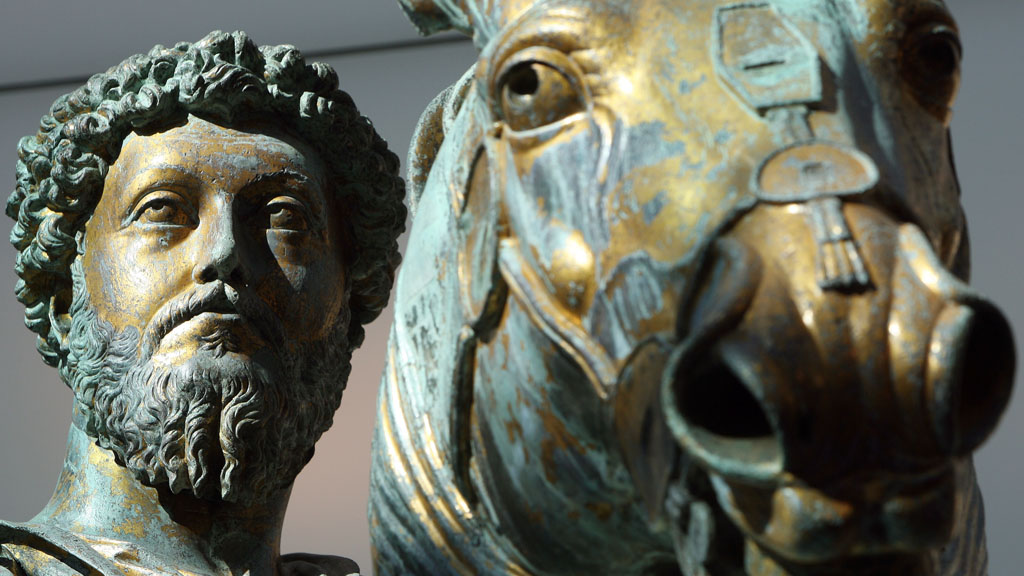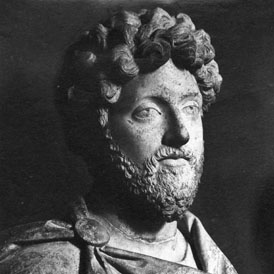Rome truths: why ancient Stoicism is making a comeback
From presidents and prisoners of war to psychotherapists and TV illusionists, people are looking back to classical philosophy for answers to modern life’s biggest questions.

Next week is international Stoic Week, a project launched last year by philosophy teachers and students at the University of Exeter.
People are encouraged to “live like a Stoic” for seven days. That means following the principles of self-control, reason, calm acceptance of fate and indifference to fame and fortune taught by ancient Greek and Roman philosophers like Epictetus, Seneca and Marcus Aurelius to see if the classical recipe for a good life still has relevance.
Stoicism was founded by Zeno of Citium, in Athens in the early third century BC. It flourished in Greece and then Imperial Rome, influencing early Christianity before being finally banned as a pagan philosophy. The name comes from the Stoa Poikile, the painted porch in Athens where early followers gathered for lectures.
There were many schools of philosophy competing for followers in ancient Greece and Rome: Epicureans, Skeptics, Cynics. Few can claim to have thousands of active followers today, let alone their own Twitter and Facebook pages.
And Stoic Week is probably the only experiment in practical philosophy endorsed by Derren Brown.

The illusionist has credited the Stoic practice of “negative visualisation” as the inspiration for his 2012 TV special Apocalypse, in which a twentysomething underachiever who took his family for granted was hypnotised and left to wake up alone in a post-apocalyptic zombie-infested wasteland.
Brown wrote: “Stoic Hellenistic philosophers advised us to rehearse regularly the loss of everything we love. Only that way, they believed, could we learn to value what we have in life, rather than fixate upon things we don’t.
“Seneca’s advice, for example, to consider the mortality of your daughter as you kiss her goodnight, may strike us as morbid. But to remind yourself regularly that your loved ones, your home, in fact everything you value might be taken away in an instant, is to value them so much more.”
The show illustrated how psychological insights from 2,000 years ago can still ring true today.
And it showed how modern assumptions about Stoics being cold and unemotional are wide of the mark.
Brown’s unsuspecting victim, Steven Brosnan, was emotionally distant before confronting the apparent loss of his family. After his brush with Stoicism, he said: “I had this love for them that I’d never really felt before.”
Live like a Stoic: techniques from the ancient sages
Dress down: the incorruptible Roman republican and lifelong Stoic Cato was fond of going barefoot and wearing the opposite of what was in fashion, in order to teach himself to rise above the petty opinions of others.
"He would accustom himself to be ashamed only of what deserves shame, and to despise all other sorts of disgrace," wrote the biographer Plutarch.
Wipe your nose: Epictetus taught his disciples to accept what was beyond their control, but to do whatever was within their power to meet life's difficulties.
"'Yes, but my nose runs'. For what purpose then, slave, have you hands? Is it not that you may wipe your nose?"
Embrace stress: Epictetus says it is problems and difficulties that make us great, as Hercules became a hero by struggling against his enemies.
He even suggests people prayed to the gods to send them misfortune, so that they could prove their worth by overcoming it. Modern research on stress suggests it is less harmful if we think of it as a positive thing.
Marcus Aurelius wrote: "It's normal to feel pain in your hands and feet, if you're using your feet as feet and your hands as hands. And for a human being to feel stress is normal - if he's living a normal life. And if it's normal, how can it be bad?"
Think "what's the worst that can happen?": The US philosopher John Irvine, in his bestselling guide to practical stoicism, singles out "negative visualisation" as one of the most powerful techniques for increasing happiness.
Irvine says that if we regularly imagine losing our possessions and loved ones, we come to appreciate them more and be grateful for what we have.
The organisers of International Stoic Week are not trying to shock participants into changing their life overnight.
Professor Christopher Gill from Exeter University said the emphasis is on gentler techniques like meditation and reflection. Would-be Stoics are asked to contemplate their smallness within the universe, practice mindfulness and visualise the whole of humanity as members of their extended family.
The core principles of stoicism are in some ways very simple but very profound. A lot of people in the world today are looking for something deeper. Professor Christopher Gill
People who take part are asked to score their experiences using various scales developed by psychologists. Last year, participants reported small but significant improvements in wellbeing, satisfaction with life and positive feelings, along with decreases in feelings in fear.
Prof Gill told us: “The core principles of Stoicism are in some ways very simple but very profound. A lot of people in the world today are looking for something deeper.”
Stoicism encourages us to view other people as “a single brotherhood of humanity” and to regain our respect for nature, he added.
“We have become too separate from the natural world, and that is why we’ve made such a mess of it. Stoicism helps us understand our place in nature, and that can be useful.”
Some Stoic techniques may well already be familiar to thousands of people who have tried certain types of psychotherapy and counselling, although their ancient roots may not be obvious.
The pioneers of cognitive behavioural therapy (CBT), Albert Ellis and Aaron Beck, both said the technique had its roots in ancient Stoicism.
Epictetus’s maxim “people are disturbed not by events that happen to them, but by their view of them” helped to inspire the now widely-accepted idea that people can change negative emotions and behaviour beliefs and can help them overcome negative emotions by changing their beliefs and patterns of thought.
Ancient Stoic ideas have gained currency with US statesmen, thinkers and writers, including former president Bill Clinton, the novelist Tom Wolfe and productivity guru Tim Ferriss.

Ancient Stoics and their modern disciples
Marcus Aurelius: Roman emperor from 161 to 180, Marcus was probably the most powerful man in the world. He found time in between personally supervising campaigns against the Germanic tribes threatening the empire’s northern borders to write the Meditations, a private journal of his deepest thoughts.
Although not intended for publication, the Meditations have gripped countless readers with their humility and distillation of key Stoic principles. Bill Clinton is a famous fan.
The wise, battle-weary emperor was portrayed by Richard Harris in the film Gladiator. As in the film, his son Commodus really did proved to be a bad emperor, although most of the plot is pure fiction.
Epictetus: In contrast to Marcus, Epictetus was born a slave, at the very bottom of the Roman social hierarchy. He was lame in one leg but refused to let it affect his sense of self, saying: “Lameness is an impediment to the leg, but not to the will.”
The fighter pilot James Stockdale, later a US vice-presidential candidate, found solace in Epictetus after he was shot down over Vietnam and taken prisoner, using Stoic ideas to endure years of torture and mistreatment by his captors with dignity.

Cato: A hugely respected Roman statesman, Cato the Younger fought for the Roman republic in the civil war against the emperor Julius Caesar.
When Caesar won, Cato chose a gruesome suicide over the shame of surrender, stabbing himself in the abdomen and disembowelling himself when his friends tried to save him.
The first US president, George Washington, saw Cato as a role model and had his exhausted troops perform dramatised scenes from the philosopher’s life during the American revolutionary war.
Stoic Week is from 25 November to 1 December 2013